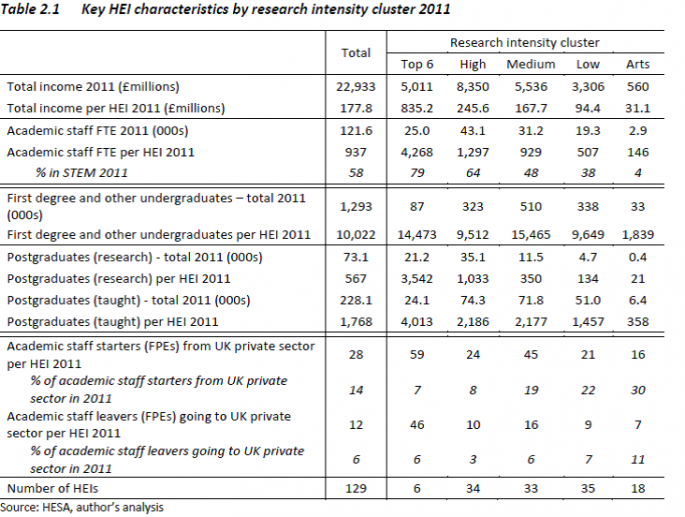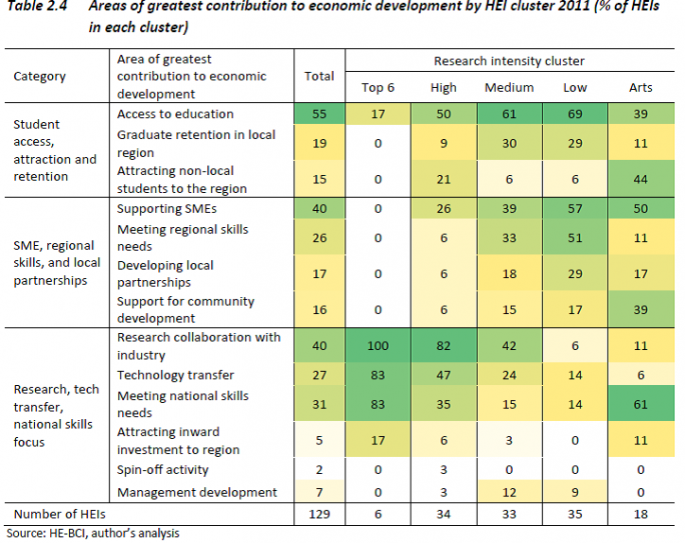Cities learning? More on the role of regional universities, linking cities and business and building learning networks
PASCAL recently posted a policy brief on the role of the ‘regional-intensive’ university. Recent days have seen some other important contributions on this and related issues in a variety of media. This note is intended to highlight some of the points made, to supplement and exemplify the discussion in the policy paper.
All the pieces referred to below have been the subject of posts on PASCAL’s twitter account. For those who do not access this, and as a development of PASCAL’s observatory function, this note is also a kind of prototype digest to reflect current activity and comment on issues pertinent to the PASCAL themes.
Diversity in university orientations
Universities in England can be clustered in a number of ways: one such is according to ‘research intensity’. Using these clusters, Ulrichsen (2014) has highlighted the differences between clusters on a number of criteria, summarised in the table below:

The resources for research are clearly strikingly different across these clusters. The main focus of his study is the knowledge exchange performance among universities in England. As part of this he has analysed the areas of greatest contribution to economic development as reported by each university principal. The table below summarises the replies, and shows clearly the very different patterns of contribution by universities in different ‘research intensity’ clusters. It seems clear that the likelihood of the greatest contribution being at regional level is strongly associated with the lower ‘research-intensity’ clusters whereas the greatest contribution of the higher ‘research intensity’ clusters is concentrated on national contributions. See the table below.
This diversity in orientation and impact is not surprising. It has been highlighted in the engagement profiling work undertaken by PASCAL within its study of university regional engagement. Most regions in England contain universities drawn from several of these clusters, but it does raise questions about the benefit local regions receive from their local universities, particularly those in the higher ‘research intensive’ clusters, and indicates a need for cities and regions to link strategically with higher education institutions in their areas to secure maximum benefit from these assets in their midst.

Supporting links between cities, universities and high-growth firms
The Centre for Cities is conducting a series of studies on city economies. Their report on linking universities and business offers a series of case studies in the UK and elsewhere showing different ways in which universities, high-growth firms and cities can collaborate. (Clarke and Williams, 2014)
Some take advantage of their strong brand (most likely to be from the high research-intensive clusters described above), whilst others build strong cross-border university – business networks to build scale.
The authors show that cities need to be clear what their role is in encouraging participation by graduate alumnae and growing firms in flexible innovation eco-systems.
You can find a link to the full report here.
Universities’ role as city-builders
The changing relationship between cities and universities in Canada is examined in an interesting piece from Addie and Keil (2014). Observing that many universities remain physically in cities but are often largely functionally separate from them, the authors draw attention to a series of developments in Canadian cities in which universities are more widely engaged in promoting economic development and adapting to changing city demographics and settlement patterns
The authors draw particular attention to the importance of knowledge mobilisation for the shaping of both economic development and the civic agenda in cities. Despite the pressures arising from Government interest in global rankings and commercialisation of research for economic development, it is in the development of closer city-university synergies that many opportunities for social and economic impact lie.
You can read the article here.
How can cities learn better?
An interesting blog from the World Bank reflects on discussion at the recent World Urban Forum on steps which must be taken to secure the promise of urbanisation. The outcome was a re-affirmation of the well-established principles of capacity building, including emphasis not only on knowledge transfer, but also on the development of human resources, effective organisations and enabling institutions. All this requires strong political backing and the strengthening of supply capacity.
The blog goes on to explore issues about who needs to learn, what is to be learned, and who has relevant knowledge. In the face of rapidly developing and changing city populations, th paper emphasises the importance of co-production of knowledge and the need for establishing broadly based learning networks, both formal and informal and virtual.
Widening circles of learning are needed to understand different stakeholders’ understandings of problems, priorities and acceptable solutions. Learning needs to be contextualised and localised to be useful to learning networks. This needs to be supported often by profound changes in professional education programmes.
Read the full article here.
Closing comments
Between them, the pieces identified here span many of the issues for the development of the learning city, and provide practical examples of ways in which aspects of this process are being addressed in several parts of the world. Through its own programme on learning cities 2020, PASCAL will be contributing to these processes through networks, workshops and projects in several cities over the next year or so. Keep in touch through this website or on social media as we seek to develop practice in this key aspect of social and economic development around the globe.
John Tibbitt
PASCAL vice-chair for policy engagement
 Printer-friendly version
Printer-friendly version- Login to post comments
- 78 reads







